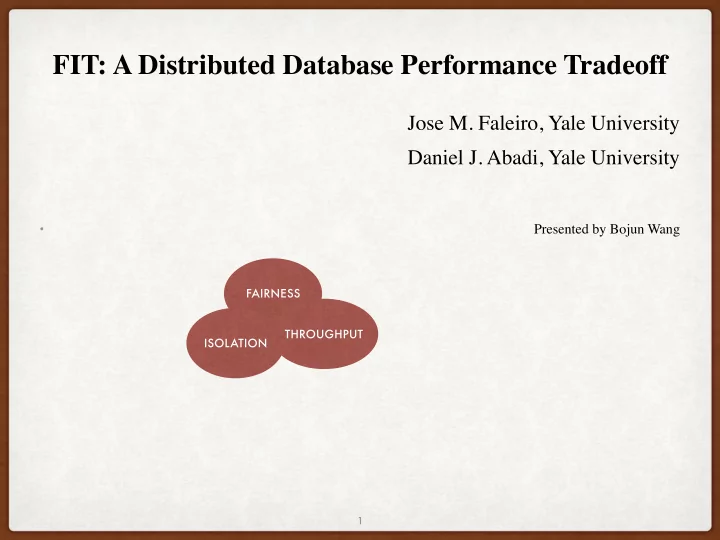

FIT: A Distributed Database Performance Tradeoff Jose M. Faleiro, Yale University Daniel J. Abadi, Yale University Presented by Bojun Wang • FAIRNESS THROUGHPUT ISOLATION � 1
Isolation v.s. Throughput and Fairness Strong isolation —> poor throughput • poor isolation —> good throughput • But fairness is another factor: FIT 3-way trade-off • FAIRNESS THROUGHPUT ISOLATION � 2
DEFINITIONS • Distributed Transaction: reads/writes involves records from multiple partitions • ASSUMPTION: a distributed database must satisfy Liveness, Atomicity, and Safety � 3
DEFINITIONS • Liveness: If distributed transaction is always re-submitted whenever it sees a system-induced abort, it’s guaranteed to commit eventually. • system-induced abort: caused by partition failure or deadlocks • logic-induced abort: caused by logic inside transaction • Safety: all nodes involved in a distributed transaction must all agree to commit, otherwise abort. • Atomicity: all/none updates of a transaction are in database. � 4
Fairness (intuitively) Database system does not deliberately prioritize nor delay certain • transactions. • Never artificially adds latency to a transaction for the purpose of facilitating the execution of other transactions. � 5
UNFAIRNESS EXAMPLES Example 1: “group commit” • • writing logs to disk is slow • write N transactions’ logs in batch, single disk write • better overall throughput • but some transactions cannot commit until threshold N is met • Example 2: “lazy evaluation” • collect transactions that reads/writes spatial close records • defer execution • amortize cost of bring records into memory • but some transactions have to wait for other transactions � 6
DEFINITIONS • Synchronization Independence: One transaction cannot cause another transaction to block or abort. (Even with conflicting data accesses) • Synchronization Independence implies Weak Isolation running with synchronization independence, cannot guarantee any • form of isolation � 7
FIT TRADEOFF a distributed transaction needs coordination between partitions • Strong isolation • —> conflicting transactions must wait — > coordination increases wait time —> bad throughput � 8
FIT TRADEOFF Distributed Transaction needs coordination between nodes • Strong isolation • —> conflicting transactions must wait synchronization independence — > coordination increases wait time reduce impact of coordination Weak Isolation Good Throughput � 9
FIT TRADEOFF Strong Isolation • coordination makes conflicting transaction wait longer • But giving up Fairness can reduct this impact • Example • Do coordination outside of transaction • Thus not increasing conflicting transactions wait time • Better Throughput Bad Fairness • � 10
FIT IN EXAMPLES Fairness Isolation Throughput G-Store Calvin Spanner Cassandra RAMP � 11
EXAMPLES G-Store Isolation Throughput Fairness • KeyGroup • Put a set of keys into one ‘leader’ partition • Reduce coordination cost • Not fair to keys not in KeyGroup • Some Transactions delayed to form new KeyGroup � 12
EXAMPLES Calvin Isolation Throughput Fairness • Pre-process a batch of transactions • generate total ordering, i.e. a redo log • serializable isolation level • eliminate deadlock; avoid expensive planning for failures forced-log writes, synchronous replication • minimize coordination cost • Pre-process a large batch of transactions for throughput Unfairness � 13
EXAMPLES Spanner Isolation Throughput Fairness • Serializable Isolation level • Guarantee Fairness • 2-phase-commit in replicated setting • synchronously replicate every node’s prepare vote • synchronously replicate coordinator’s final commit decision • Coordination during transaction —> hurt throughput � 14
EXAMPLES Cassandra Isolation Throughput Fairness • “batch transaction”: UPDATE SET DELETE • allow clients to see partial results • give up isolation • no coordination required for conflicting “transactions” • good throughput and good fairness � 15
EXAMPLES RAMP Isolation Throughput Fairness • Read Atomic: All/None of a transaction updates are visible • Implemented by Read Atomic Multi-Partition • guarantee synchronization independence • weak isolation � 16
FIT IN EXAMPLES Fairness Isolation Throughput G-Store Calvin Spanner Cassandra RAMP � 17
FIT, IN MULTICORE DATABASE Isolation Throughput Fairness • SILO: Multicore Machine Database, Serializable • Tradeoff fairness to gain throughput • append logs to shared in-memory buffer • expensive to append logs due to synchronization cost • each core store logs in core-local buffer • periodically move logs from local to shared • Amortize synchronization cost over batch of transactions. Unfairness � 18
FIT, IN MULTICORE DATABASE Isolation Throughput Fairness • Dopple: Multicore Machine Database, Serializable • joined phase —— aggregate —— split phase • joined phase, only one record exists, all transaction allowed • split phase, replica, only allow commuting operations. Unfairness � 19
FIT TRADEOFF Coordination is a price Pay it during transaction + strong isolation ==> poor throughput • Pay it before transaction + strong isolation ==> unfairness • Give up isolation (reduces coordination impact) ==> fairness & • throughput � 20
Recommend
More recommend